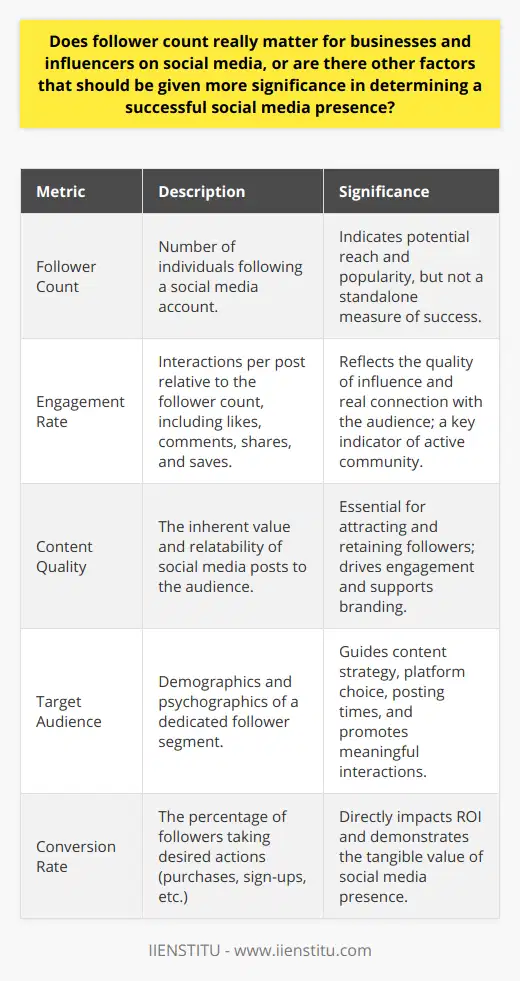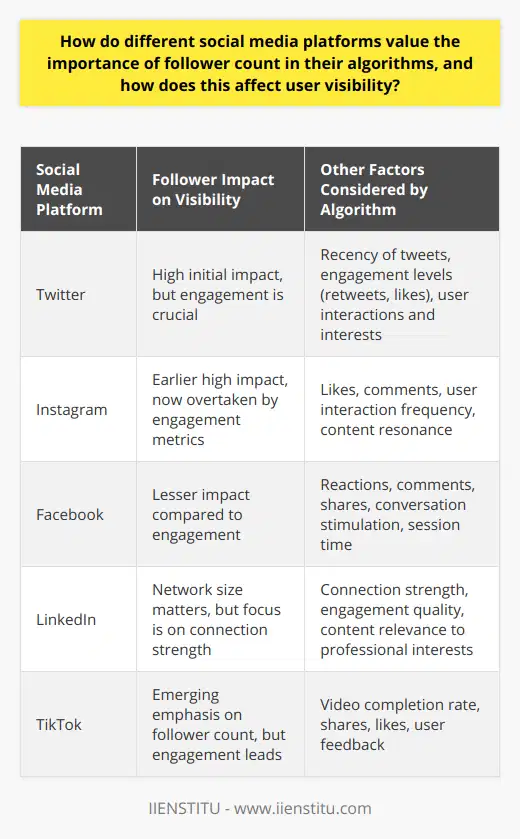
The social media scene has become very crowded, and it can be challenging to stand out from the crowd. In this social media mess, many people would say that social media success is correlated with how many followers one has on social media sites such as Twitter or Instagram. In other words, the more followers you have, the better social media figures that you are in general.
A large following does not necessarily mean a broad audience because most social media users follow friends and family rather than celebrities or brands. On Twitter, for example, according to a study conducted by Myk Pono in 2012, about 50% of users follow accounts belonging to individuals. However, the study found that only about 16% of social media users follow brands or companies.
Furthermore, social media stars are generally at a disadvantage against major social networks because they do not have the same opportunities to reach out to their audience. This is because social media sites such as Instagram and Facebook have algorithms that prioritize social engagement over the number of followers. As a result, high-engagement posts receive more exposure than posts with lower engagement levels. While algorithms can significantly differ among social media platforms, one thing remains certain: organic growth is important for attracting followers on social media. However, this will take time, so patience is required! According to their functions, social media success should be measured differently for different platforms. On Twitter, it is about social reach. On Instagram, social engagement, and on Facebook, social media success is determined by social visibility. Therefore, it is important to have clear goals to measure social media success before engaging in social media activity.
Social influence metrics should be a primary concern for individuals interested in social media as a career path or as a platform for self-promotion. Social influence measures the level of impact one's posts may have on other people's feeds. Social amplification can measure this, which calculates how much exposure your content receives from others sharing it with their audience. In terms of social followers, there are plenty of tools that calculate how many new followers you can gain from particular posts as Twitter analytics.
In conclusion, social media success is not necessarily measured by the number of social media followers. Still, it will often depend on whether or not social reach and social amplification can be accomplished due to high levels of homegrown following and social visibility, which result from a high level of engagement.
What Is The Popularity Of The "Follow Back" Culture?
The "follow back" culture by itself has been commonplace for years now. It can be attributed to major social accounts that return the favor to build social relations through this type of social reciprocity. The more people you are connected with on social media, the better social influence you may have within your social audience. But lately, "follow back" culture has taken a rather negative turn where receiving follows from random strangers, or social accounts that don't follow back is seen as “lame” or “uncool.”
Nowadays, social media users are more selective by choosing who they want to be connected with and who they'd like to follow them back simply because these new cultural norms put pressure on having large social audiences when social media is about social influence.
Social networking sites are called "social" for a reason - having an active social media presence is important because social influence can be measured by how many people interact with your content. If you're just tweeting into the wind with no engagement, then what kind of influence do you have?
Is There Anything More To Social Media Than Follower Count?
Social media has become a vital marketing instrument for many brands. Many are employing their services to aid in their business's branding, promotion, and ultimately growth. However, with so many social media platforms out there, it can be tricky to know which one fits your brand. It is also essential to consider that not all platforms are used equally by potential customers or businesses themselves.
It is becoming more and more difficult for brands to maintain a large social media following.
Social media has blown up over the last decade. Each platform strives to outdo its competitors to gain market share. So it's only natural that these platforms are trying to entice businesses to their side through advertising or increased exposure. However, at what cost?
The value of engaging with your customers is arguably much more significant than any ad campaign could amount to. Unfortunately, many businesses forget this when they splurge on 'vanity metrics' such as follower count. However, the truth is that there is far more value in customer engagement than just the number of people who follow you online.
If you are looking to grow your business, you mustn't neglect the importance of customer engagement. Follower count may be fun to see on a vanity metric report, but how well you engage with your customers and potential clients really matters in growing your company. Developing relationships with people who will become loyal fans for life can happen through content marketing or social media campaigns, so don't forget about these two forms of marketing when considering which strategy will best meet your needs. So, what's more, important than follower count? Customer engagement!
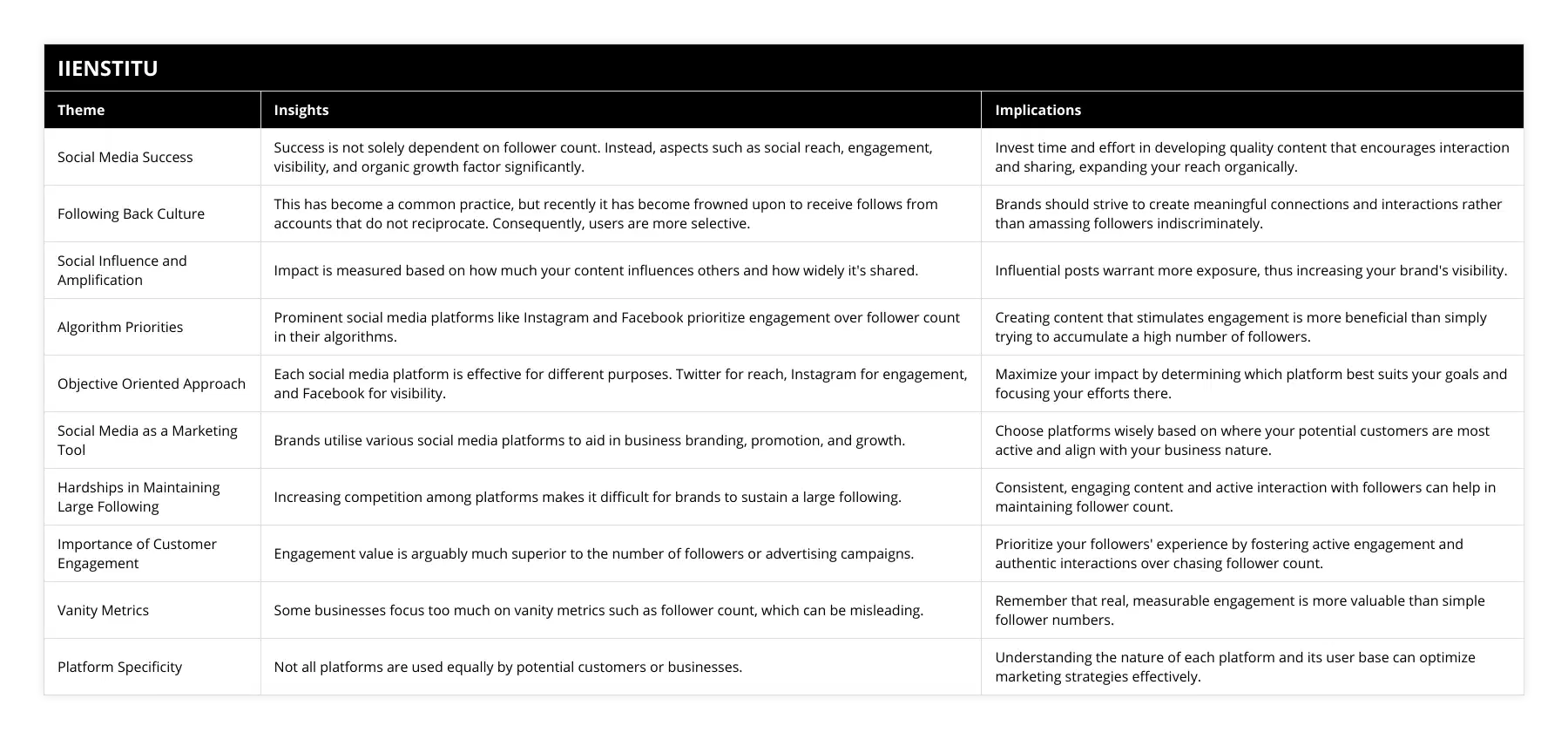
Frequently Asked Questions
Why is the number of followers important on social media?
Significance of Follower Count
A crucial aspect of social media lies in the number of followers a user possesses, as it directly impacts their online presence and influence. This importance can be better understood through examining content reach, credibility enhancement, and opportunities for monetization.
Amplification of Content Reach
Firstly, a substantial follower base guarantees greater visibility of content shared on social media platforms. As more individuals follow a user, the likelihood of their posts being shared, commented upon, and reacted to increases. Consequently, a higher engagement rate results in heightened visibility, efficiently spreading the user's message and ideas to a broader audience.
Promotion of Credibility
Another advantage of having a large number of followers involves the enhancement of a user's credibility. A significant following is perceived as a validation of the user's ideas, expertise, or content quality. It functions as a form of social proof, making others more inclined to trust that said user offers valuable, engaging, or entertaining content. In this sense, a larger follower base bolsters the user's authority and legitimacy in their chosen niche or industry.
Monetization Opportunities
The number of followers is also vital in providing opportunities to monetize a user's social media presence. With a sizeable following, businesses and advertisers are more inclined to collaborate and offer sponsored content agreements, affiliate marketing partnerships, or influencer marketing campaigns. These collaborations allow users to generate income through their online presence and leverage it for financial benefits.
To conclude, the number of followers on social media is critical for users intending to capitalize on their online presence. A significant following not only offers greater reach for content dissemination but also enhances credibility and provides opportunities for monetization. Ultimately, a strong social media following serves as a powerful tool in achieving online success and establishing a valuable digital brand.
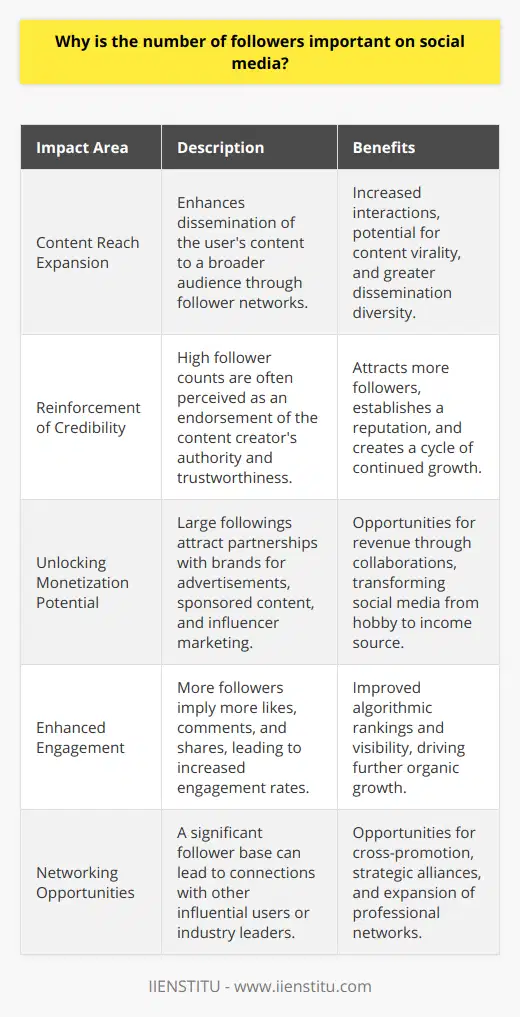
Is it true that the number of followers is the most important factor in evaluating social media success?
Significance of Follower Count
In evaluating social media success as it pertains specifically to a blog post, it is arguable that the number of followers a user has may not always be the most crucial determinant. Although some may consider it to be a definitive factor, other key parameters can be taken into account when assessing the efficacy and value of a social media post or platform. Multiple aspects, such as engagement, quality, and relevance, contribute to an accurate evaluation of social media success.
Engagement Metrics
First, measuring genuine audience interactions on a blog post can paint a more precise picture of its effectiveness in comparison to just looking at the number of followers. Indicators such as comments, shares, and reactions reveal how the content truly resonates with the audience. Furthermore, these metrics highlight the extent to which readers are genuinely invested in the content and motivated to engage with it beyond a passive consumption.
Quality over Quantity
The overall quality of a blog post should not be overlooked in the process of evaluation. Factors such as coherence, relevance, and well-presented arguments hold immense significance. While a high number of followers might indicate potential reach, the content's quality ultimately decides whether or not these followers will stick around and engage with the post. Consequently, high-quality content tends to yield more significant long-term success compared to content that only focuses on gaining large volumes of followers.
Target Audience Relevance
Understanding the target audience is essential for accurately evaluating social media success. For instance, a smaller but highly targeted following might be more valuable to a niche blog compared to a large yet unengaged audience. It suggests that niche-related content may perform better and generate a higher level of investment from a smaller, more relevant follower base, even though the total number of followers seems insignificant compared to broader social media accounts.
In conclusion, while the number of followers can play a role in evaluating social media success in terms of reach, it should not be considered as the sole determinant. Engagement metrics, the quality of a blog post, and its relevance to the target audience could provide a more comprehensive evaluation of how successful a post or platform genuinely is in the world of social media.
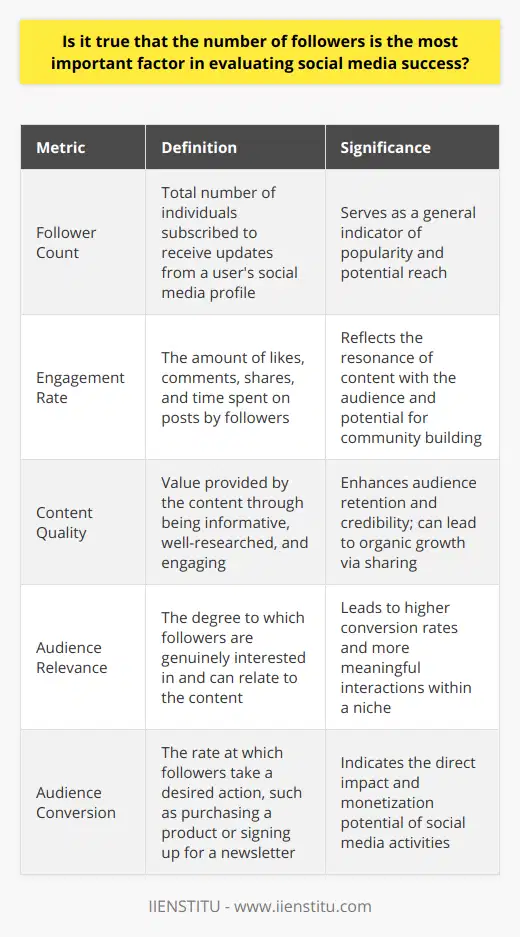
How do you assess the importance of follower count in the context of an overall social media strategy?
Assessing Follower Count Relevance
In evaluating the significance of follower count within a comprehensive social media strategy, one must examine several crucial aspects. Firstly, the number of followers serves as an instant credibility indicator for users; a higher count suggests that the account offers valuable content, thereby attracting more followers. Consequently, this may help in building an audience.
Engagement Levels Vs. Follower Count
However, a substantial follower count does not necessarily guarantee high engagement levels. Instead, focusing on fostering meaningful connections and encouraging interactions with the audience is vital. Active engagement might include responding to comments, sharing relevant content, as well as liking and retweeting user-generated content. Hence, examining the engagement of an account provides a more accurate picture of its performance, rather than merely considering the follower count.
Quality Over Quantity
Moreover, a more in-depth analysis reveals the importance of quality over quantity - attracting authentic and relevant followers interested in your content will lead to increased engagement, conversions, and long-term growth. Alternatively, a large follower count consisting of fake or disinterested accounts will not contribute to a successful social media strategy.
Target Audience Analysis
To maximize efficiency, an effective social media strategy should focus on attracting the target audience to create a loyal and engaged community. Assessing the relevance of accounts following you can provide valuable insights into the demographics that resonate with your content, along with feedback on the aspects that require modification to better appeal to the intended audience.
Balance within Social Media Strategy
In conclusion, while maintaining a high follower count is undoubtedly a component of a successful social media strategy, solely relying on it is not sufficient. A balanced approach, emphasizing the importance of audience engagement, authenticity, and target audience monitoring, proves to be indispensable in assessing the overall effectiveness of a social media strategy.
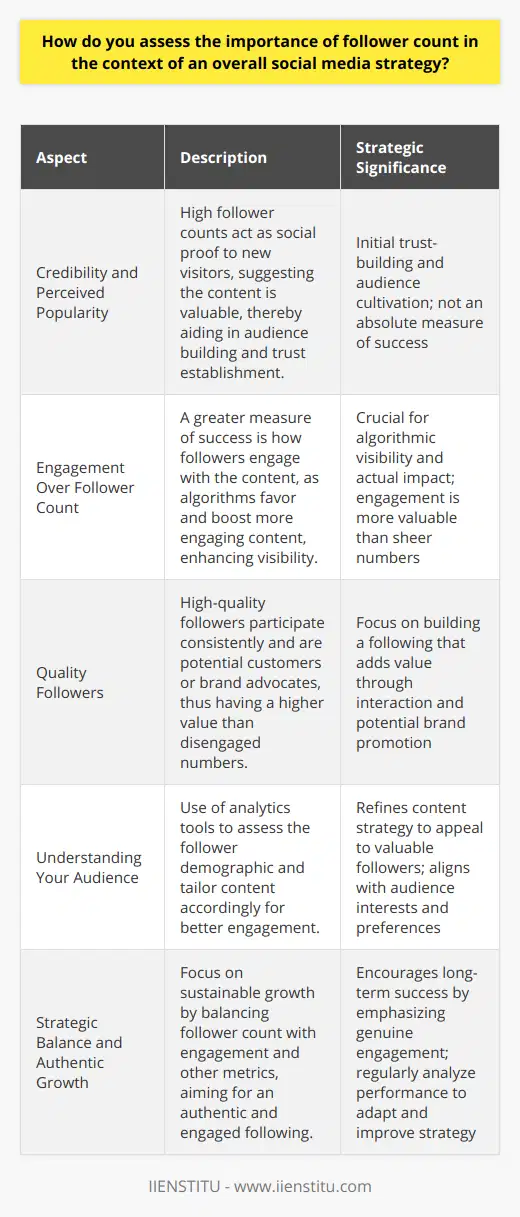
How do you measure social media success beyond simply considering follower counts?
**Defining Social Media Success**
To measure social media success beyond simply considering follower counts, multiple dimensions and metrics need to be examined. These metrics encompass engagement, reach, and conversion rates which offer a more holistic understanding of a social media strategy's effectiveness.
**Engagement Metrics**
Engagement refers to the interaction between users and the content published on social media platforms. Key engagement metrics include likes, comments, shares, retweets, and mentions. By analyzing these data, it is possible to understand the extent to which followers are not only consuming but actively engaging with the content.
**Reach Metrics**
Reach refers to the number of unique users who see a specific piece of content posted on social media. Reach metrics help to determine the visibility of a brand or message and the potential of content going viral. Impressions, for example, represent the total number of times a piece of content has been displayed, regardless of whether or not it was clicked on. Furthermore, examining reach metrics also involves tracking the growth of follower base over time and evaluating the spread of content beyond the immediate audience.
**Conversion Metrics**
Conversion metrics focus on the effectiveness of social media efforts in driving desired behavior, typically involving users taking a specific action like visiting a website, com-pleting a signup form, or purchasing a product. These metrics are vital to understanding the return on investment (ROI) of social media activities as they shed light on which social media campaigns are producing tangible and actionable results for the organization. For instance, calculating click-through rates (CTR) allows for the assessment of how successful a social media post is in generating visits to the target destination.
In conclusion, measuring social media success involves analyzing a range of metrics alongside follower counts to create a comprehensive view of an organization's online presence. By examining engagement, reach, and conversion metrics, organizations can make informed decisions to optimize their social media strategy and achieve meaningful outcomes.
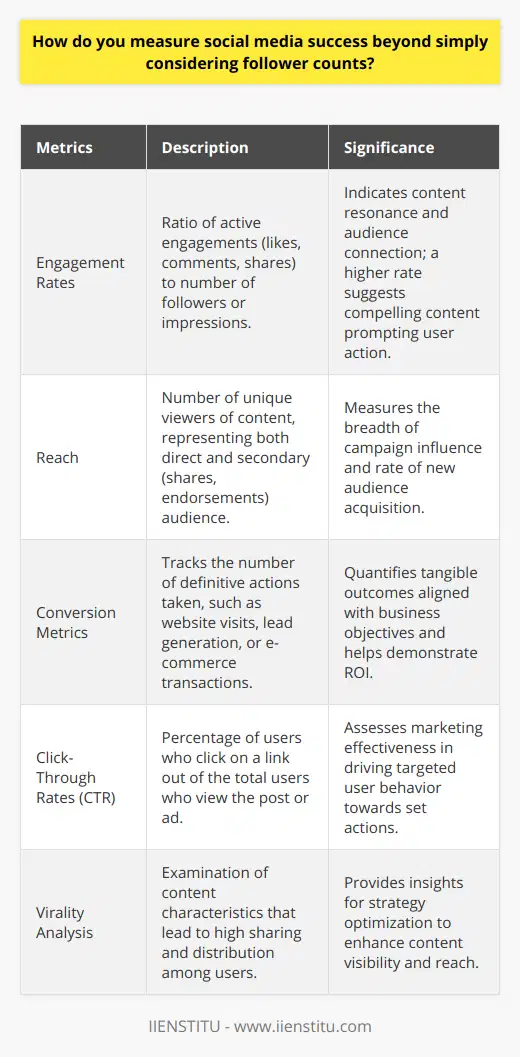
In what ways can having a high number of followers improve a social media account's overall performance and influence?
Enhanced Visibility and Reach
Having a high number of followers can significantly improve a social media account's overall performance and influence. One of the most apparent advantages of possessing numerous followers is enhanced visibility and reach. In essence, a large audience ensures that the account's content has the potential to be seen by a broader range of people, thereby increasing the likelihood of engagement and interaction.
Boost in User Engagement
Besides, a high follower count on social media positively impacts user engagement, such as likes, comments, and shares. As a result, the account's content is more likely to be noticed by other social media users and even reach beyond the platform. These interactions contribute to establishing a vibrant community around the account, thereby reinforcing its influence and growing its online presence.
Attracting Brand Collaborations
Another crucial benefit of having a substantial follower base is attracting potential business collaborations or partnerships. Brands and organizations are constantly seeking social media influencers to promote their products and services to their target audiences. A social media account with a large number of followers increases its appeal to potential advertisers, leading to potential marketing opportunities and financial gains.
Improving Credibility and Authority
Moreover, social media accounts boasting a high number of followers are often perceived as credible and authoritative sources of information within their respective niches. These accounts are seen as having influence and impact on the opinions and behaviors of their audiences. With this increased credibility, users are more likely to trust the content shared by the account, ultimately leading to a higher level of influence in the online space.
Algorithm Advantages
Lastly, another benefit of having a vast follower base is associated with the algorithms employed by social media platforms. Most platforms use algorithms that prioritize popular content, which has already garnered significant engagement from users. As such, accounts with a large following are more likely to have their content pushed to a broader audience, further enhancing their online presence and influence.
In conclusion, possessing a high number of followers on social media can considerably improve an account's overall performance and influence. Increased visibility, enhanced user engagement, potential brand collaborations, heightened credibility, and algorithm advantages are just some of the ways that a substantial follower base contributes to an account's success and influence in the online sphere.
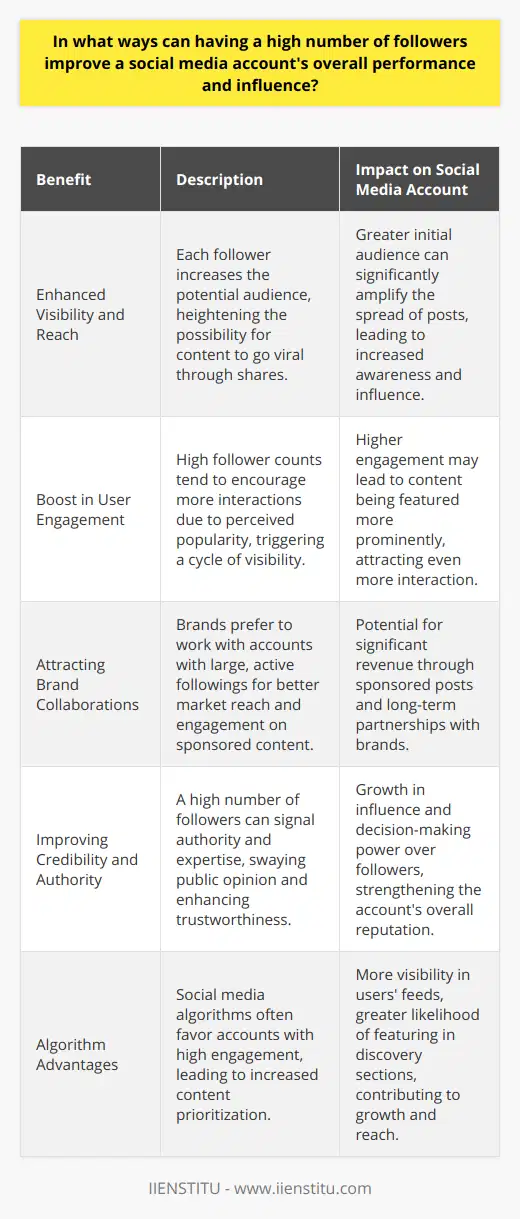
Is it possible for a social media account with a smaller follower count to still be considered successful, and what other factors should be taken into account?
Defining Success in Social Media
When discussing the success of a social media account, it is necessary to move beyond the simplistic notion that success relies solely on follower count. Whilst the number of followers undoubtedly has an impact on the potential reach and influence of a social media account, it is important to also consider other factors such as engagement, quality of content, and longevity. In this respect, a smaller follower count may not be indicative of a less successful account, especially when viewed within a broader framework incorporating these additional indicators.
Engagement and Interaction
A crucial factor in determining social media success is the extent to which followers are engaging with the content produced. High levels of interaction – such as likes, shares, and comments – can be considered a successful outcome, as they enable the dissemination of the account's messages and ideas to a wider audience. Therefore, even if an account has a smaller follower count, if its content generates significant engagement it can still be considered successful.
Quality of Content
Additionally, the quality of content produced plays a significant role in determining a social media account's success. Regularly providing valuable, relevant, and entertaining content tailored to the target audience can build trust and rapport with followers, and contribute to the account's overall impact. Content that resonates with followers may also lead to a loyal following, irrespective of the absolute number of followers. Thus, evaluating social media success requires taking into account the value offered through the content produced.
Longevity and Persistence
Finally, the longevity of a social media account can be seen as a marker of its success. An account operating continually over a period of time demonstrates persistence and commitment to the medium. This consistency can contribute to establishing a track record of trustworthiness and credibility, which can in turn bring about increased influence over time. As such, even if an account has a smaller follower count, its longevity can serve as an indication of its success.
In conclusion, the success of a social media account cannot solely be measured by follower count. Instead, a more complete understanding requires examining factors such as engagement, quality of content, and longevity. These aspects reveal that it is certainly possible for an account with a smaller follower count to be considered successful, particularly when viewed within a more comprehensive framework.
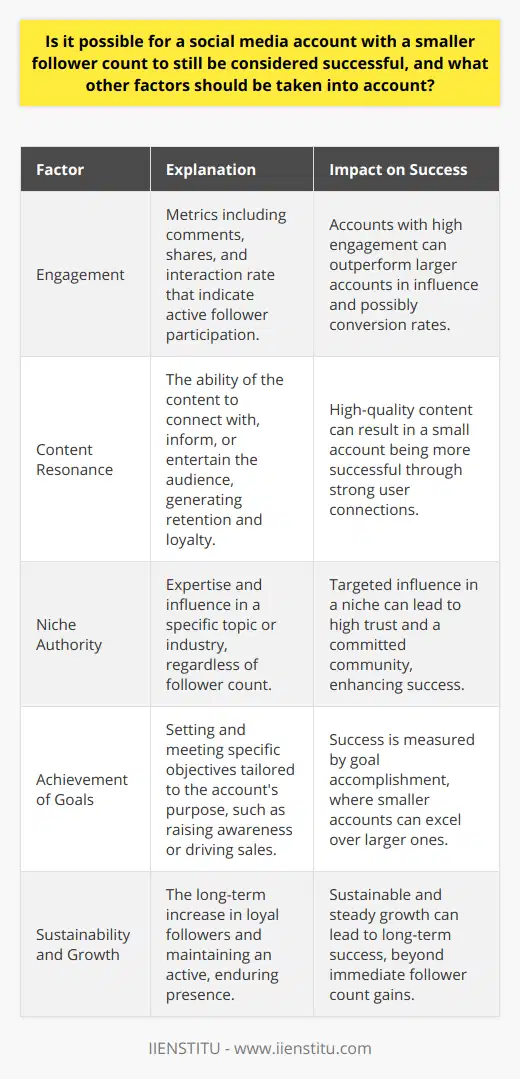
How do you measure social media success beyond the number of followers and likes?
**Evaluating Engagement Patterns and Metrics**
To measure social media success beyond the number of followers and likes, it is essential to consider various factors, including evaluating user engagement patterns and other relevant metrics. One critical aspect of user engagement is the volume and quality of comments on a blog post, which demonstrates a higher level of commitment from the audience than just liking the content. By analyzing the types and sentiments of comments, one can determine their degree of resonance with readers and identify areas of improvement.
**Tracking Click-Through Rates and Shares**
Ultimately, a critical measure of social media success is how well the content drives users toward the desired action, such as visiting a website or making a purchase from a blog post. By using analytics tools to track click-through rates (CTR), marketers can gain insights into their content's effectiveness in capturing the reader's attention and encouraging them to perform specific actions. Additionally, assessing the number of shares can shed light on the extent to which readers consider the content valuable and worth sharing with their networks, effectively expanding the content's reach and impact.
**Retention Rate and Return Visitors**
Another crucial metric to evaluate social media success is the retention rate, which measures the percentage of users who continue to engage with the content on a regular basis. High retention rates indicate that the material is compelling enough for users to return to the blog post, signifying that it resonates with their interests and preferences. Coupled with the metrics related to return visitors and the visit duration, these indicators provide insights into the content's relevance and ability to sustain user attention.
**Quantifying Brand Awareness and Mentions**
Moreover, it is essential to quantify the impact of the social media content on brand awareness and reputation. Tools that measure brand mentions, sentiment analysis, and engagement with branded keywords can shed light on the overall success of a blog post in creating a positive image and driving conversations around the brand. These metrics can help determine the return on investment (ROI) of the blog post and its contribution to the organization's broader marketing goals.
In conclusion, measuring social media success goes beyond follower count and likes, encompassing a broader range of metrics that highlight user engagement, content effectiveness, retention rate, and brand awareness. By focusing on these factors, marketers can achieve a more comprehensive understanding of their blog post performance and devise improvements to maximize their social media endeavors.
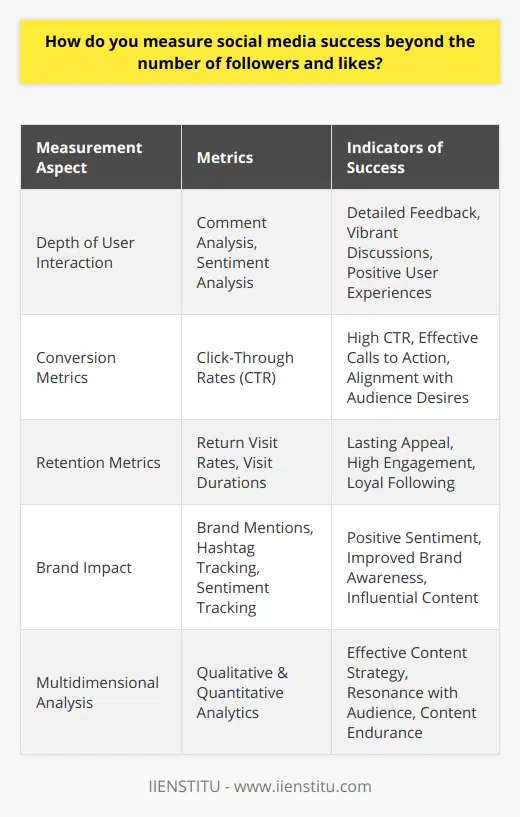
What are the key indicators of a successful social media campaign, apart from a large number of followers?
Assessing Engagement Rates
A crucial indicator of a successful social media campaign, besides a large number of followers, is the engagement rate. This encompasses factors such as likes, comments, shares or retweets, and click-throughs on links shared by the page or account. High engagement signifies that the audience finds the content relevant, interesting, and worth interacting with or sharing, reflecting the effectiveness of the campaign in resonating with its target audience.
Tracking Conversion Metrics
Another critical aspect to consider is conversion metrics. These determine if the social media campaign directly impacts business objectives, such as driving website traffic, generating leads or sales, acquiring email subscribers, or influencing other measurable actions. By monitoring conversions, marketers can evaluate the actual return on investment (ROI) resulting from the campaign, and assess its efficacy in meeting its desired goals.
Analyzing Audience Growth Rate
Although the number of followers might be an apparent measure, it is essential to look into audience growth rate as well. This metric evaluates the change in the number of followers or subscribers over time, providing insights into whether the campaign effectively reached and attracted new audience members. A steady growth rate signifies a healthy expansion of the campaign's digital reach and implies its relevancy and appeal to the target audience.
Measuring Social Share of Voice
Social share of voice (SSoV) is a significant metric in ascertaining the brand's presence and influence across social media platforms. SSoV measures the percentage of online conversations and mentions related to the brand or campaign compared to its competitors—a higher SSoV indicating a more significant influence and better recognition within its niche. A successful social media campaign should aim to increase its SSoV and strengthen the brand's identity in the digital sphere.
Benchmarking Competitive Performance
Lastly, comparing one's social media campaign performance to that of competitors in the same industry can be an invaluable method to gauge success. By benchmarking factors such as engagement rate, conversion metrics, audience growth, and SSoV against industry 'standards,' businesses can identify their strengths and weaknesses within their social media strategies and make necessary adjustments to stay competitive and improve their campaign's performance.
In conclusion, to truly assess the success of a social media campaign, various factors must be considered, including engagement rates, conversion metrics, audience growth rates, social share of voice, and competitive performance. These key indicators provide a holistic picture of the campaign's effectiveness, and help businesses in making informed decisions for future strategies and maximizing ROI from social media initiatives.
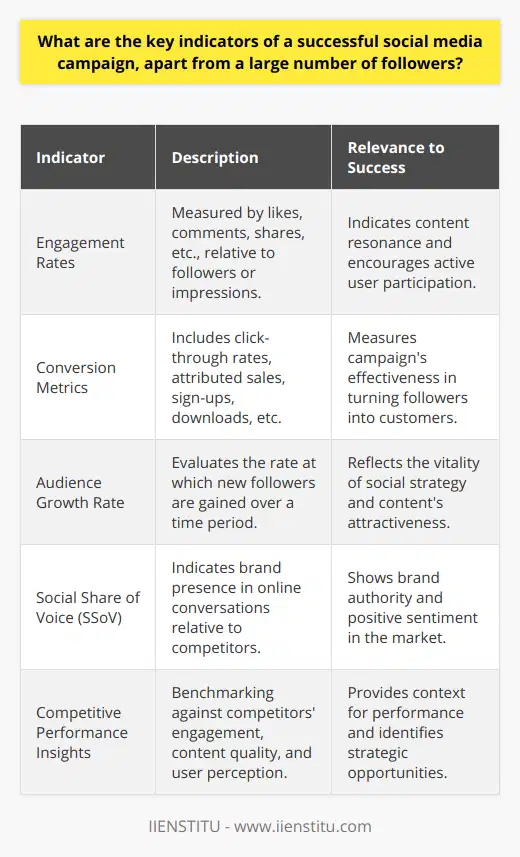
How can the quality and engagement of one's follower base be assessed in the context of an overall social media strategy?
Assessing Follower Quality and Engagement
Examining the Metrics
To assess the quality and engagement of a blog's follower base in the context of an overall social media strategy, blog managers should examine various metrics that provide insights into the audience's behavior. Crucial metrics include engagement rates, audience demographics, and qualitative feedback.
Tracking Engagement Rates
Engagement rates are a key performance indicator, as they clearly indicate the level of interactivity with the blog content. Comparing the average likes, comments, and shares per post to the total follower count can provide an insightful evaluation of the followers' responsiveness to the published material.
Considering Audience Demographics
Understanding the followers' demographics can be valuable in determining the quality of the audience. Blog managers should consider parameters like age, gender, and location, as high-quality followers often share common traits that align with the blog's target audience. Identifying these traits can help cater the content to attract the desired readership.
Analyzing Qualitative Feedback
Evaluating qualitative feedback from followers, such as comments and direct messages, provides a more in-depth understanding of their engagement. Observing trends like recurring positive or negative sentiments in these feedback channels can indicate the overall satisfaction of the target audience and reveal potential areas for improvement.
Optimizing Content
Identifying Influential Followers
Another noteworthy aspect of follower quality is identifying influential followers who can amplify the blog's reach. Blog managers should monitor who among their followers have a significant online presence, as these individuals can act as catalysts for content distribution within their own networks if engaged effectively.
Adjusting Posting Frequency
The frequency of blog updates, in conjunction with user engagement, plays a significant role in follower quality management. Blog managers should strike the right balance between posting too frequently, which can lead to follower fatigue, and posting too infrequently, which may cause the audience to lose interest. Experimenting with different posting schedules and analyzing the engagement levels can guide the blog manager in identifying the optimal frequency.
In conclusion, a blog's follower quality and engagement are of paramount importance for the success of a social media strategy. Through examining metrics, understanding user demographics, and optimizing content, blog managers can elevate their blog's position and foster a community of loyal and engaged followers.
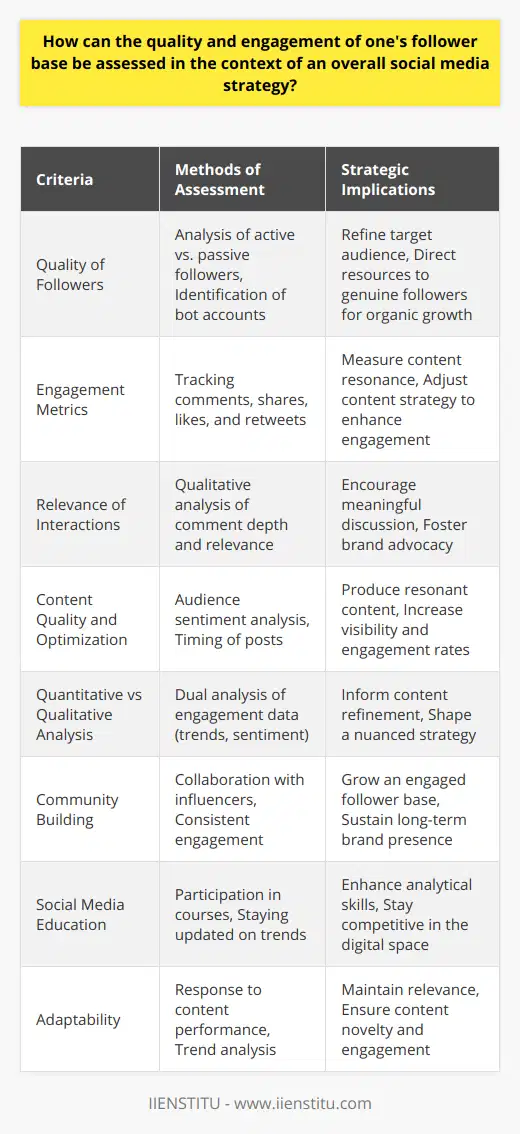
In what way does the engagement rate of an account play a role in determining the success of a social media profile alongside follower count?
Significance of Engagement Rate
The engagement rate of an account is a critical metric in evaluating the success of a social media profile, alongside the follower count. It measures the extent to which the audience interacts with the content posted, through likes, comments, shares and clicks. This metric allows content creators and marketers to assess the effectiveness of their strategies and make adjustments.
Account Growth and Follower Count
A higher engagement rate is an indication of high-quality content, which subsequently leads to account growth and an increase in followers. High follower count results in increased visibility, credibility, and influence, thus attracting potential partnerships, sponsorships or advertising revenue.
Driving Factors of Successful Social Media Profiles
In order to achieve a successful social media profile, creators must develop content that resonates with their audience, catering specifically to their preferences and interests. Posting frequency, timing and relevance are key components in fostering audience engagement, ultimately leading to higher engagement rates and follower growth. Consistent engagement with the audience can also create a sense of community and loyalty, further contributing to the success of a social media profile.
The Interplay of Engagement Rate and Follower Count
In summary, the engagement rate plays a vital role in determining the success of a social media profile, acting as a metric for the quality and impact of the content provided. It shows a direct correlation with the growth of a profile's follower count. Both engagement rate and follower count work in tandem to enhance the credibility, visibility, and overall success of a social media profile. Therefore, focusing on creating engaging content and fostering meaningful relationships with their audience is essential for bloggers to achieve their desired outcomes on social media platforms.
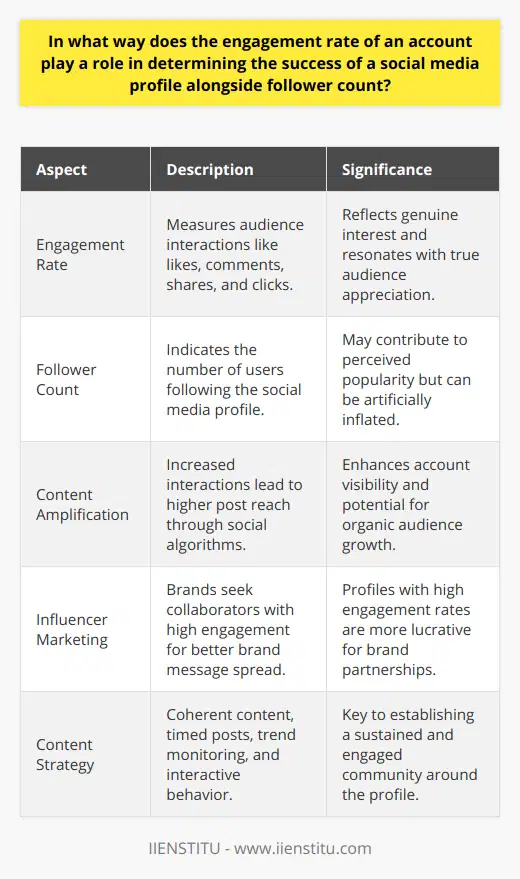
Would you consider the quality and relevance of content shared on social media to be a significant factor in measuring success, even if the number of followers is not remarkably high?
Subheadings: Quality versus Quantity, Engagement and Relevance, Long-term Impact
Quality versus Quantity
In evaluating the success of a blog post shared via social media, the quality and relevance of its content hold significant weight, regardless of the quantity of followers. A blog post that addresses the targeted audience effectively and provides value through pertinent information demonstrates a higher level of success compared to a post with a high follower count but lacking substance.
Engagement and Relevance
Success is not solely determined by the number of followers but the level of engagement generated by the content as well. A blog post that elicits thoughtful conversations, prompts users to share it within their social network, and motivates them to explore the issue further, represents substantial success. Thus, the relevance of the content shared through social media serves as a key performance indicator by fostering active participation and stimulating readers' interest.
Long-term Impact
Furthermore, while a high following may generate immediate attention, it is the quality and relevance of the blog that ensures long-term impact and credibility for the creator. Readers are more likely to return to a blog and recommend it to others when they find the content insightful, informative, and engaging. In this respect, focusing on the substance of the content shared on social media has a lasting influence, as it can establish a loyal readership base and foster a solid reputation.
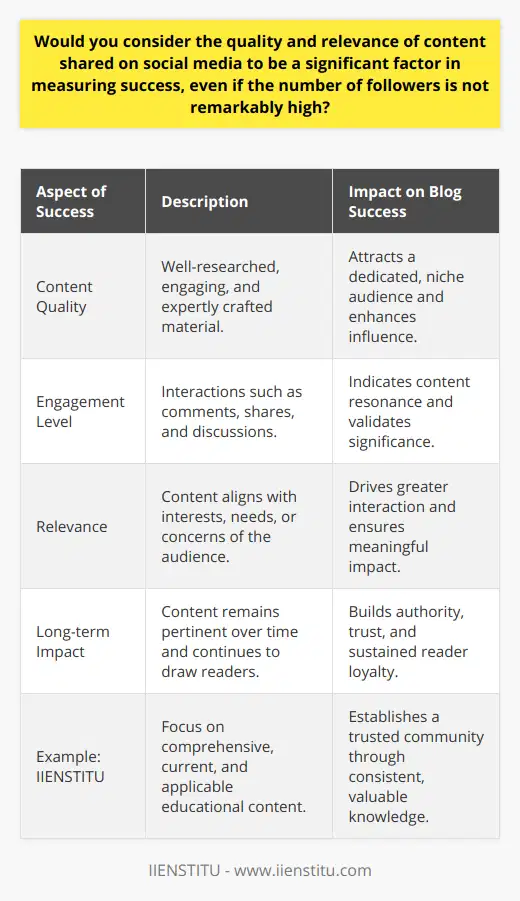
How do you measure social media success, considering both follower count and other metrics such as engagement and reach?
Measuring Social Media Success
Metrics to Consider
To accurately measure social media success for a blog post, it is important to consider various performance metrics, rather than solely relying on follower count. Integrating both quantitative and qualitative factors, such as engagement and reach, generates a more comprehensive understanding of a blog post's impact and effectiveness.
Engagement Metrics
One essential aspect of determining social media success is by analyzing engagement metrics. These include likes, comments, shares, and clicks, which provide insight into the viewers' active interaction with the blog post. Moreover, assessing the sentiment - whether positive or negative - of comments received allows for a deeper understanding of audience perception and their response to a particular piece of content.
Reach Metrics
In addition to engagement, evaluating reach metrics is vital in establishing social media success. Reach refers to the number of unique users exposed to the blog post, which can be measured through various indicators, such as impressions and views. This metric allows content creators to gauge the extent to which their message has been disseminated among their target audience.
Follower Count
While having a high number of followers on social media can be indicative of popularity, it might not always translate to optimum success. A high follower count with little engagement suggests that the content may not be resonating with the intended audience. Therefore, considering other metrics alongside follower count is crucial to determine the overall effectiveness of the blog post.
Evolving Metrics for Success
It is also important to note that the definition of success may evolve over time. As the blog grows and the audience expands, it may be necessary to adjust the weightage given to each metric and establish new benchmarks for measuring success. Keeping the assessment process adaptable and fluid helps maintain a clear understanding of the blog post's objectives and the corresponding social media performance indicators.
Conclusion
In conclusion, measuring social media success for blog posts requires a multifaceted approach, taking into account essential factors such as engagement, reach, and follower count. Assessing a diverse range of performance metrics allows content creators to gain a more accurate understanding of the impact and efficacy of their content, which ultimately facilitates better decision-making and strategy development for future content creation.
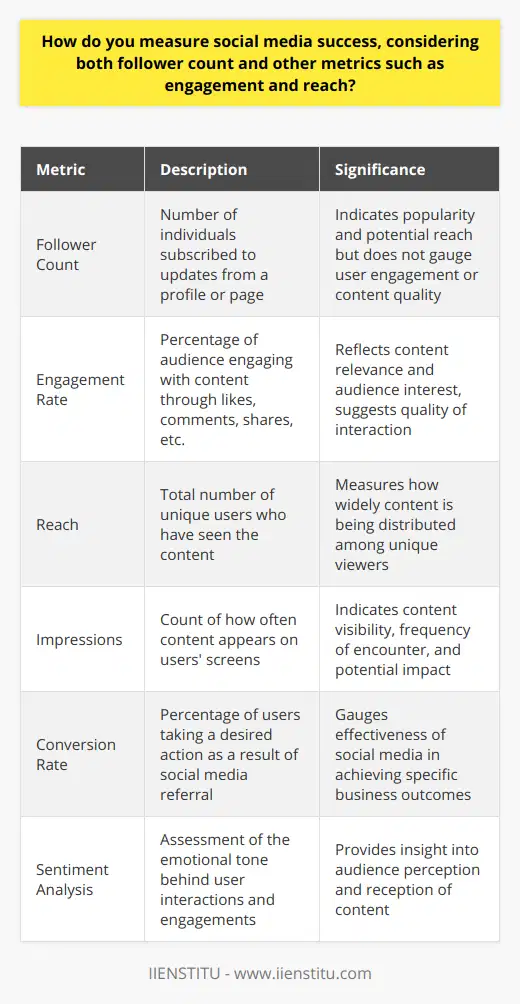
How significant is the number of followers in comparison to other factors, such as content quality, when evaluating the success of a social media account?
Significance of Follower Count
In assessing the success of a social media account, particularly for a blog post, the number of followers is a significant factor to consider. However, other aspects such as content quality, engagement, and audience demographics also play crucial roles in determining the overall success of a social media account.
Role of Content Quality
Content quality is the backbone of a successful social media account. High-quality content that is informative, engaging, and appealing to the target audience attracts and retains followers. Well-crafted content fosters credibility and trust, helping to build a loyal audience that promotes organic growth and strengthens the account's reputation.
Engagement Metrics
Aside from content quality, engagement metrics such as likes, shares, and comments offer insight into the success of a social media account. These metrics indicate the level of interaction and interest from the audience, reflecting the impact of the content shared. High engagement levels suggest that the content resonates with the followers and maintains their interest, essential indicators of account success.
Demographics and Target Audience
The make-up of the account's audience is another factor to consider when evaluating success. Understanding the demographics and interests of the audience helps to tailor content and strategies to resonate with the target group. An account that successfully targets and appeals to its ideal audience can be highly successful, even with a lower follower count.
In conclusion, while the number of followers is a significant factor in evaluating the success of a social media account, it should not be the sole determinant. Content quality, engagement, and understanding the target audience contribute significantly to the overall success and sustainability of a social media account.
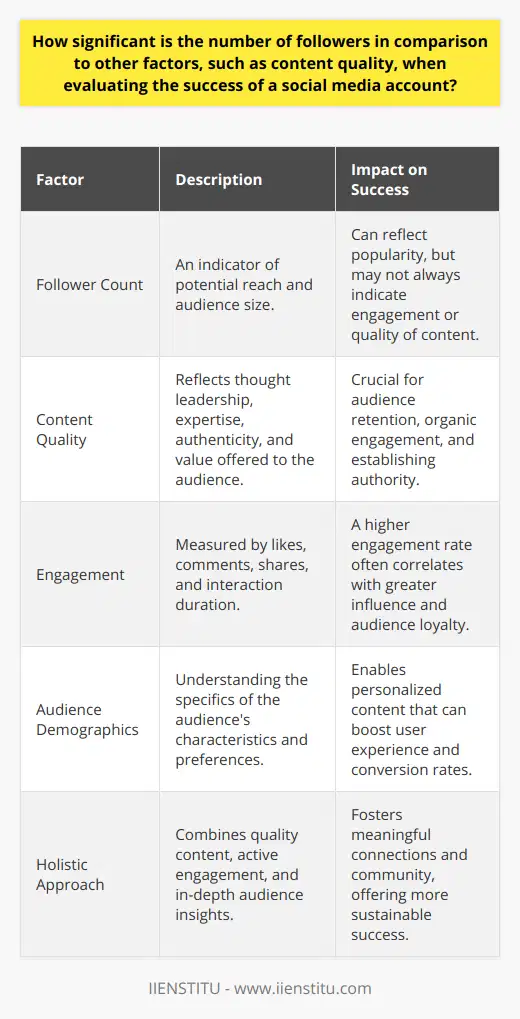
What role does follower count play in algorithms across various social media platforms, and how might these algorithms prioritize engagement over a high quantity of followers?
Role of Follower Counts in Algorithms
Follower count, a widely tracked metric on social media platforms, has a significant impact on the algorithms behind content dissemination. These algorithms, responsible for determining the visibility and reach of an account's content, often prioritize engagement metrics such as likes, comments, and shares over mere number of followers.
Emphasis on Engagement Metrics
Social media platforms typically focus on engagement metrics to ensure the content users are exposed to is relevant and captivating. As a result, content with higher engagement is more likely to be displayed prominently on users' feeds. Consequently, accounts with a smaller but more active following may enjoy greater visibility compared to those with a higher follower count but lower user interaction.
Algorithmic Prioritization
This prioritization in the algorithm is essential in maintaining a balance between the user's desire to discover new content and the platform's need for advertising revenue. It encourages creators to produce high-quality, engaging content by rewarding them with increased exposure. Thus, users benefit from a more interesting and dynamic feed, and advertisers receive boosted ad performance.
Impact on Reach and Visibility
When algorithms prioritize engagement over follower count, content creators must reconsider their strategies. A focus on content that resonates with the target audience becomes crucial, as opposed to simply amassing a large number of followers. Acknowledging this shift in algorithms, many influencers and marketers strive to cultivate a loyal and interactive following to ensure their content remains visible to users.
In conclusion, follower count, though essential in social media algorithms, does not solely determine the reach of an account's content. Instead, these algorithms prioritize engagement metrics, promoting content that has stimulated user interaction. This focus benefits users, creators, and advertisers, fostering a dynamic and engaging social media experience.
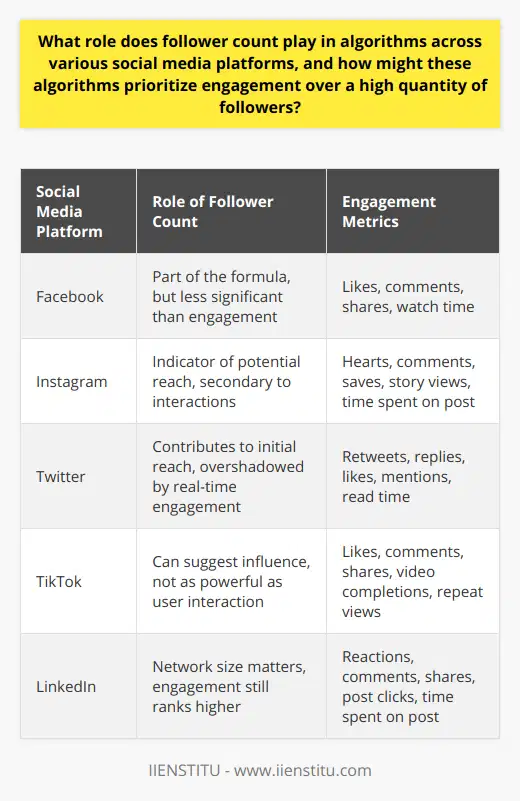
What is an optimal range for follower count on social media to ensure both credibility and meaningful engagement?
Follower Count and Credibility
An optimal range for follower count on social media is a crucial aspect in ensuring credibility and meaningful engagement. Generally, having a larger number of followers is an indicator of a more reliable account. However, there is no specific numerical threshold that guarantees credibility; it varies according to the context and the audience.
Factors Affecting Optimal Follower Range
Several factors can affect the optimal range of followers in a social media platform. These factors include the size of the target audience, the platform's algorithms, and the content creator's objectives. For example, niche accounts with specialized content may have a smaller follower base but higher engagement levels.
Quality Over Quantity
While a high follower count may suggest credibility, the quality of the audience is more critical. Meaningful engagement is best achieved when the followers are genuinely interested in the content, leading to higher engagement rates and more valuable interactions. For this reason, accounts should prioritize attracting genuine followers rather than focusing on solely increasing their follower count.
Maintaining Meaningful Engagement
To maintain meaningful engagement, content creators must consistently produce high-quality content that appeals to their audience. This involves understanding the audience's preferences, monitoring their feedback, and adjusting the content strategy accordingly. Maintaining meaningful engagement ultimately relies on the ability to constantly adapt and evolve in response to the audience's needs.
In conclusion, the optimal range for follower count on social media cannot be universally defined, as it is contingent on several factors, including the context and target audience. Nonetheless, focusing on the quality of followers and maintaining meaningful engagement is paramount to achieving credibility and ensuring long-term success in social media platforms.
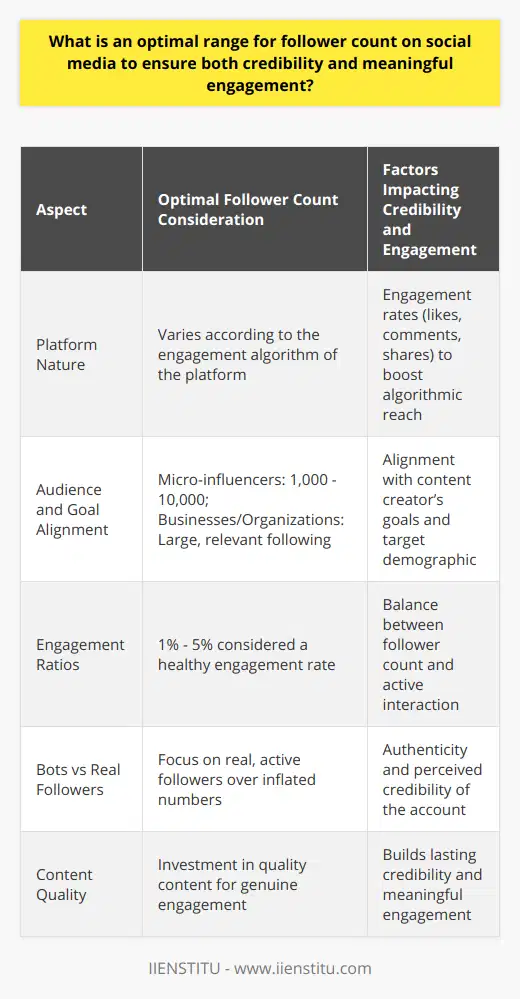
How does the ratio of followers to followed accounts impact the perceived success of a social media profile?
Impact on Success Perception
The ratio of followers to followed accounts is an important factor in determining the perceived success of a social media profile. A higher ratio, with more followers and fewer followed accounts, tends to indicate a more successful and influential profile.
Influential Profiles
Influential profiles often possess a high follower-to-followed ratio as they are seen as industry leaders or experts in their respective fields. Their perceived success increases as more individuals choose to follow their content and opinions, creating an authoritative presence on the platform.
Engagement Levels
The engagement level on posts published by profiles with high follower-to-followed ratios is also pivotal in the perception of success. High-quality content and interactions tend to attract more followers and increase engagement, further highlighting the profile's significance in their field.
Authenticity and Reliability
Maintaining a balanced ratio establishes a profile's authenticity and reliability, as social media users evaluate an account by understanding its genuine connection with others. A balanced ratio typically indicates that the profile owner interacts regularly with their audience and follows other accounts for insightful content.
Potential Drawbacks
However, a high ratio is not always an accurate measure of success. Instances of purchased followers or automated engagement tools can artificially inflate a ratio, misleading actual influence and reach. In these cases, a thorough examination of engagement metrics is crucial to determine an account's true success.
In conclusion, the ratio of followers to followed accounts on social media profiles plays a crucial role in the perceived success of a profile. High ratios generally indicate successful, influential profiles with engaged audiences, fostering an authoritative and reliable presence on the platform. However, it is worth considering that an inflated ratio may not always represent genuine influence and engagement, and further evaluation may be necessary.
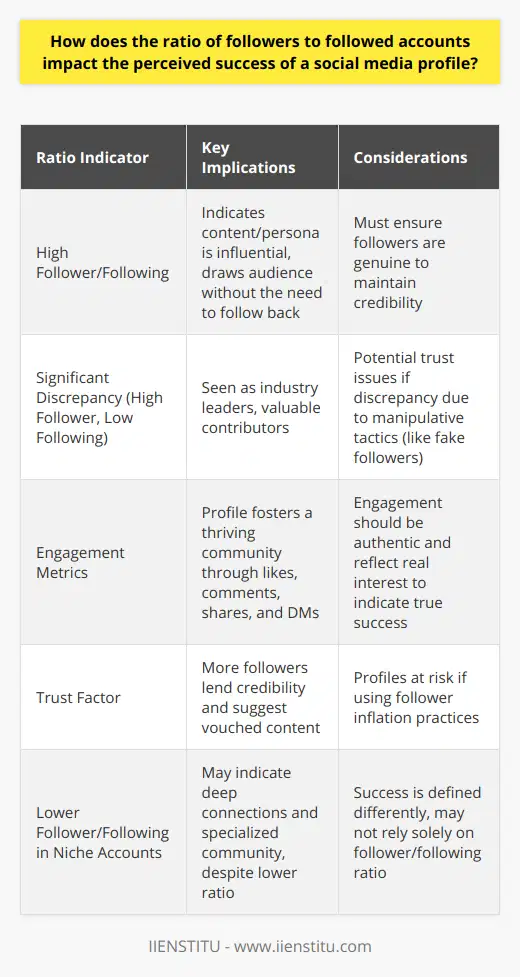
Can the impact of social media success be accurately assessed through a combination of follower count, engagement rate, and content relevance?
The Impact of Metrics on Social Media Success Assessment
The Variables for Success Assessment
Assessing social media success requires considering various factors, including follower count, engagement rate, and content relevance. By examining these elements in combination, one can have a comprehensive understanding of a blog's influence and reach.
The Role of Follower Count
A blog's follower count is a crucial indicator of its popularity and potential impact. A higher number of followers suggests that the blog has attracted a wide audience, making it an essential metric for assessing social media success.
Evaluating Engagement Rate
Engagement rate, which includes likes, shares, and comments, reflects the level of interaction between a blogger and their audience. Accounting for this enables one to measure the resonance of the content produced. Thus, gauging engagement rate is paramount when determining the success of a blog.
Assessing Content Relevance
To achieve and maintain social media success, bloggers must create and share content that is relevant, valuable, and useful to their audience. The relevance of the material published significantly affects engagement and loyalty, ultimately contributing to the blog's success and impact.
Limitations
Despite the apparent significance of these metrics, several factors may limit their efficiency in accurately assessing social media success. The acquisition of fake followers or engagement, for example, can distort the analysis and falsely inflate a blog's perceived success.
Conclusion
Considering follower count, engagement rate, and content relevance in tandem, one can develop a more accurate assessment of a blog's social media success. However, it is crucial to recognize the potential limitations in this approach and seek supplementary data and qualitative insights to support a comprehensive understanding of the blog's impact.
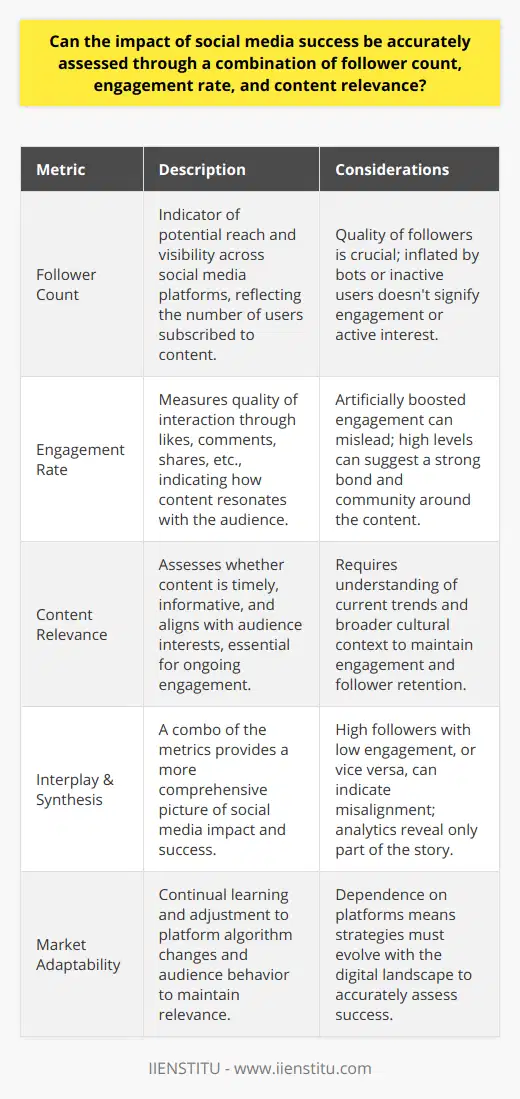
What are the benefits of having many followers on social media in terms of credibility, visibility, and engagement?
Credibility Enhancement
Having numerous followers on social media platforms provides a significant increase in an individual or business's credibility. Succinctly, people perceive accounts with many followers as more trustworthy and reliable.
Visibility Improvement
Moreover, abundantly followed accounts benefit from enhanced visibility. That is, social media algorithms promote popular profiles, consequently increasing their visibility to a broader audience. Crucially, this expanded reach can foster business growth and brand awareness.
Engagement Increase
Finally, having a considerable follower count leads to higher levels of engagement. More followers equate to more likes, comments, and shares, all of which create a dynamic, interactive online community. Active engagement with followers can further solidify the account's credibility, thus producing a virtuous cycle of growth.
In conclusion, maintaining a large follower base on social media platforms possesses myriad advantages. It bolsters credibility, amplifies visibility, and stimulates engagement, invariably contributing to the account's overall success and influence in the digital sphere. However, the content quality must accompany these follower-based benefits to ensure sustainable growth. It further underscores the importance of maintaining high standards in social media activities, requiring a careful, strategic approach.
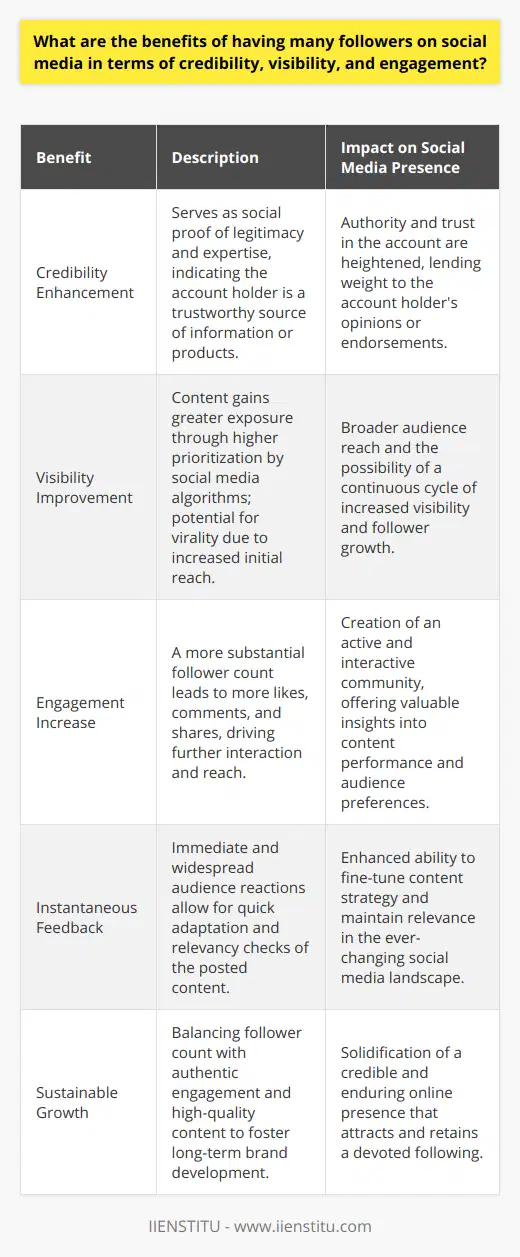
How do you measure success on social media by taking into account various metrics such as follower growth rate, engagement rate, and content quality?
Measuring Success with Follower Growth Rate
To gauge success on social media, a primary metric to examine is follower growth rate. This involves evaluating the rate at which users follow a page, indicating the efficiency of visibility and reach strategies. A steadily increasing follower growth rate suggests successful implementation of strategies to attract the target audience's attention.
Assessing Success through Engagement Rate
Another significant metric is the engagement rate which gauges the level of interaction between users and the content posted. It involves tracking likes, comments, shares, and other forms of interaction. A high engagement rate indicates that the content resonates with the audience, fostering connections.
Evaluating Success via Content Quality
Lastly, assessing content quality bears crucial information about success on social media. This could be through user feedback or by analysing engagement rates of individual posts. High-quality content often drives higher engagement rates long term, albeit simultaneously requiring more input and effort.
Put together, follower growth rate, engagement rate, and content quality provide a holistic view of social media success. Each of these metrics offers valuable insights into different aspects of the social media strategy, enabling constant refinement and optimisation. By regularly measuring these metrics, marketers can not only assess their current performance but also identify opportunities for improvement.
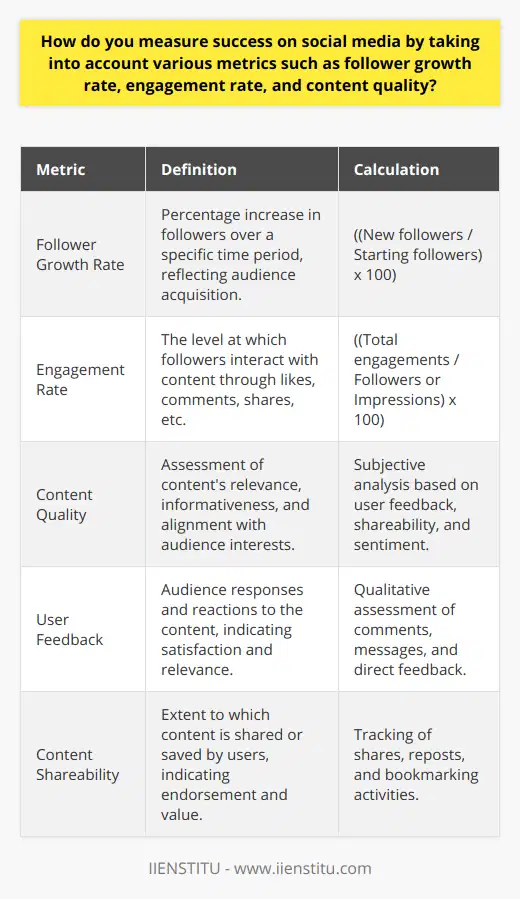
Does follower count really matter for businesses and influencers on social media, or are there other factors that should be given more significance in determining a successful social media presence?
Impact of Follower Count
Undeniably, a high follower count enhances the visibility of businesses and influencers on social media. It can serve as a demonstration of popularity and credibility, attracting more customers or followers. Moreover, businesses can exploit a larger audience base to maximize the reach and effect of marketing efforts.
Importance of Engagement Rates
The number of followers, however, should not overshadow aspects such as engagement rates. A relatively smaller number of engaged followers, who consistently like, comment, and share posts, can be more beneficial than a larger but inactive following. A high engagement rate indicates a loyal and active audience that is likely to respond to calls to action.
Quality of Content
Another crucial factor is the quality of content posted. Consistently delivering high-quality, relevant, and informative content can help build a dedicated and engaged audience irrespective of sheer follower count. Businesses and influencers should focus on creating content that resonates with their audience, engages them, and encourages them to interact.
Target Audience
Lastly, the targeted demographic plays a pivotal role. One must not overlook the importance of curating content that appeals directly to their target audience. Understanding your audience's preferences, behaviors, and interests can streamline content creation processes and ultimately amplify engagement rates and business returns.
In conclusion, though follower count does hold certain significance in social media's sphere, it does not guarantee success. Factors like engagement rates, the quality of content, and a well-targeted approach to audience preferences should hold more weight in determining successful social media presence.
